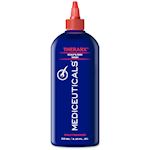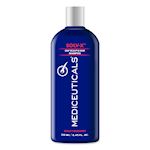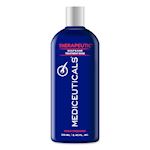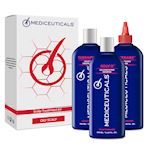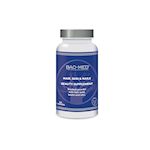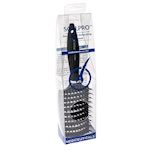WHAT CAUSES FOLLICULITIS?
The development of folliculitis does not have a single cause. Several factors provoke inflammation of the hair follicles. However, in most cases, bacteria is the culprit. Sometimes it is a fungus, yeast or parasite.
Bacteria are always on your skin and scalp. This normally does no harm at all and you will not notice it. This changes if the skin is damaged. When the skin is damaged a bacterium, fungus, yeast, or parasite, can penetrate the skin and cause an infection. Damaging the skin usually happens due to one of the following events:
- By shaving or epilating.
- By wearing a bandage or a plaster on the skin for a longer period of time, which closes the skin.
- By applying very greasy creams or oils to your skin or to your hair.
- By wearing tight clothing that chafes.
In addition, inflammation of the hair follicles can also sometimes be caused by certain medications, which then have folliculitis as a possible side effect. Fortunately, this rarely happens.
CAN FOLLICULITIS BE TREATED?
The symptoms of folliculitis are usually so obvious that a diagnosis is easy to make. Probably already by yourself, but otherwise certainly by your GP. Fortunately, folliculitis is easy to treat. In many cases, treatment is not even necessary. By following certain advice yourself (which we discuss in detail below), it usually goes away on its own within 1 to 2 weeks. However, there are also variants of folliculitis that do not heal on their own or that keep coming back. In this case, a remedy against bacteria or yeasts is usually required as treatment.
For example, a GP often prescribes medication against bacteria if there is a suspicion that they are causing the inflammation. This usually concerns (antibiotic) pills that you take every day for 7 days. Is it suspected that a mold is the culprit? You will often be prescribed a cream, shampoo or pills against fungi.
Sometimes ingrown hairs from shaving are the cause of folliculitis. Then you may be very bothered by this. In such a case, the doctor often prescribes antibiotics or a cream against the inflammation. You will also receive information about shaving less often and properly.
WHAT CAN YOU DO YOURSELF FOR FOLLICULITIS ON THE SCALP?
With a bit of luck, folliculitis will go away on its own. To support that process, there are a number of things you can do yourself. For example, it is highly advisable not to scratch an itch, as this will break the pimples. A scab will form on the pimple and with a bit of luck a scar will remain behind. It is better to leave the pimples alone. That speeds up the healing process.
Because you probably touch pimples with your hands from time to time, it is wise to wash your hands regularly with soap. Also, cut your nails short. This prevents you from moving the bacteria that may be responsible for the inflammation to other places on your skin.
Wash your hair with a shampoo and conditioner that is suitable for use on scalp problems. The Scalp Therapies line from Mediceuticals has been specially developed to tackle various scalp problems. Many of the products in this line help treat folliculitis. They have an anti-inflammatory effect and help fight harmful bacteria and yeasts/fungi. That's exactly what is needed to support recovery from folliculitis.
When styling the hair, it is important not to use greasy products, but instead opt for alternatives. Mediceuticals hair styling products have been specially developed for people with sensitive scalp. They are water-soluble and protect the scalp against harmful external influences. The gentle ingredients are safe to use, even if the hair follicles are inflamed.
WHAT HAPPENS NEXT?
Folliculitis is an annoying inflammation of the hair follicles, but fortunately, one that almost always goes without complications. In many cases, the condition resolves on its own within 1 to 2 weeks. If this does not happen, the doctor can prescribe medication that helps in most cases. Even if the folliculitis keeps coming back, it is wise to visit the doctor and opt for treatment with medication.
If you manage to keep the folliculitis at bay despite the itching, your scalp will be back to the same condition it always was after healing. Do you find it difficult to keep your pimples at bay and still scratch them? Then there is a chance of scars. Fortunately, these are not easily visible on the scalp under your hair.
To support healing and prevent recurrence, it is important to use hair care products that are gentle on the skin. Are you curious about which Mediceuticals products these are? Please contact a certified Mediceuticals® salon in your area for professional advice. You can use our Salon Finder for this.




